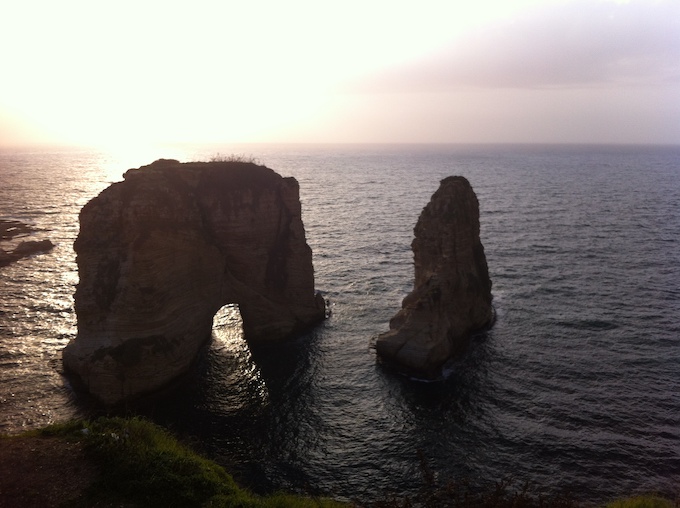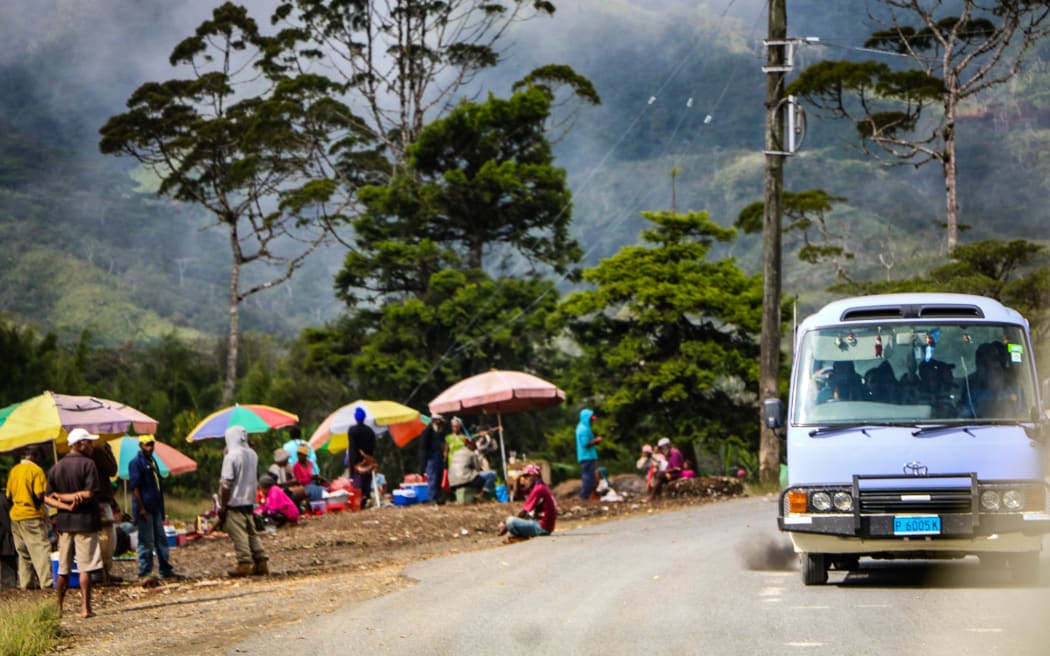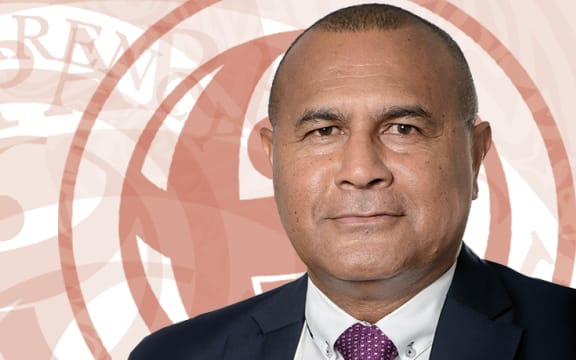The United States has vetoed a UN Security Council ceasefire resolution — for the fourth time — in Israel’s war on Gaza, while Hezbollah demands a complete ceasefire and “protection of Lebanon’s sovereignty” in any deal with Israel. Amid the death and devastation, Joe Hendren reflects on his time in Lebanon and examines what the crisis means for a small country with a population size similar to Aotearoa New Zealand.
SPECIAL REPORT: By Joe Hendren
Since the Israeli invasion of Lebanon I can’t help but think of a friend I met in Beirut.
He worked at the Regis Hotel, where I stayed in February 2015.
At one point, he offered to make me a Syrian dish popular in his hometown of Aleppo. I have long remembered his kindness; I only wish I remembered his name.
- READ MORE: US vetoes Gaza ceasefire resolution — Hezbollah set for ‘long war’
- How was a UN aid convoy robbed near Israeli military positions?
- Other Gaza, Lebanon reports
At the time, his home city was being destroyed. A flashpoint of the Syrian Civil War, the Battle of Aleppo lasted four long years. He didn’t mention this of course.
I was lucky to visit Lebanon when I did. So much has happened since then.
Economic crisis and a tragic port explosion
Mass protests took over Lebanese streets in October 2019 in response to government plans to tax WhatsApp calls. The scope of the protests soon widened, as Lebanese people voiced their frustrations with ongoing economic turmoil and corruption.
A few months later, the covid-19 pandemic arrived, deepening the economic crisis and claiming 10,000 lives.
On 4 August 2020, the centre of Beirut was rocked by one of the largest non nuclear explosions in history when a large amount of ammonium nitrate stored at the Port of Beirut detonated. The explosion killed 218 people and left an estimated 300,000 homeless. The government of Hassin Diab resigned but continued in a “caretaker” capacity.
Tens of thousands of protesters returned to the streets demanding accountability and the downfall of Lebanon’s political ruling class. While some protesters threw stones and other projectiles, an Al Jazeera investigation found that security forces violated international standards on the use of force. The political elite were protected.
In 2021, The World Bank summarised the situation:
“The Lebanon financial and economic crisis is likely to rank in the top 10, possibly top three, most severe crises episodes globally since the mid-nineteenth century. This is a conclusion of the Spring 2021 Lebanon Economic Monitor (LEM) in which the Lebanon crisis is contrasted with the most severe global crises episodes as observed by Reinhart and Rogoff (2014) over the 1857–2013 period.
“In fact, Lebanon’s GDP plummeted from close to US$ 55 billion in 2018 to an estimated US$ 33 billion in 2020, with US$ GDP/capita falling by around 40 percent. Such a brutal and rapid contraction is usually associated with conflicts or wars.”
The Lebanon Poverty and Equity Assessment, produced by the World Bank in 2024, found the share of individuals in Lebanon living under the poverty line more than tripled, rising from 12 percent to 44 percent. The depth and severity of poverty also increased over the decade between 2012 and 2022.
To make matters worse, the port explosion destroyed Lebanon’s strategic wheat reserves at a time when the war in Ukraine drove significant increases in global food prices. Annual food inflation in Lebanon skyrocketed from 7.67 percent in January 2019 to a whopping 483.15 percent for the year ending in January 2022. While food inflation has since declined, it remains high, sitting just below 20 percent for the year ending September 2024. The World Bank said:
“The sharp deterioration of the Lebanese pound, which lost 98 percent of its pre-crisis value by December 2023, propelled inflation to new heights. With imports constituting about 60 percent of the consumption basket (World Bank, 2022), the plunging currency led to triple-digit inflation which rose steeply from an annual average of 3 percent between 2011 and 2018, to 85 percent in 2019, 155 percent in 2020, and 221 percent in 2023 . . .
“Faced with falling foreign exchange reserves, the government withdrew subsidies on medication, fuel, and wheat further fuelling rising costs of healthcare and transport (Figure 1.2). Rapid inflation acted effectively as a highly regressive tax, striking hardest at the poor and those with fixed, lira-denominated incomes.”
The ongoing crisis of the Lebanese economy has amplified the power of Hezbollah, a paramilitary group formed in 1982 in response to Israel’s invasion and occupation of Lebanon.
“Hezbollah is famous for entrenching its power in an elaborate social infrastructure of Islamic welfare. The social grip of those structures and services is increased by the ongoing crisis of the Lebanese economy. When the medical service fails, desperate families turn to the Hezbollah-run health service,” says Adam Tooze
As banks imposed capital controls, many Lebanese lost confidence in the financial system. The financial arm of Hezbollah, the al-Quad al-Hassan Association (AQAH), experienced a significant increase in clients, despite being subject to US Treasury sanctions since 2007.
The US accuses Hezbollah of using AQAH as a front to manage its financial activities. When a 28-year-old engineer, Hassan Shoumar, was locked out of his dollar accounts in late 2019, he redirected his money into his account at AQAH: “What I care about is that when I want my money, I can get it.”
While Hezbollah portrays itself as “the resistance”, as a member of the governing coalition in Lebanon, it also forms an influential part of the political elite. Adam Tooze gives an example of how the political elite is still looking after itself:
“[T]he Lebanese Parliament in a grotesque act of self-dealing in January 2024 passed a budget that promised to close the budget deficit of 12.8 of GDP by raising regressive value-added tax while decreasing the progressive taxes levied on capital gains, real estate and investments.
“For lack of reforms, the IMF [International Monetary Fund] is refusing to disburse any of the $3bn package that are allocated to Lebanon.”
While the protest movement called for a “technocratic” government in Lebanon, the experiences of Greece and other countries facing financial difficulties suggest such governments can pose their own risks, especially when they involve unelected “experts” in prominent positions.
One example is the political reaction to the counterproductive austerity programme imposed on Greece by the European Commission, European Central Bank and IMF in the aftermath of the 2007-2008 financial crisis. This demonstrates how the demands of international investors can conflict with the needs of the local population.
Lebanon carries more than its fair share of refugees
Lebanon currently hosts the largest number of refugees per capita in the world, despite its scarce resources. This began as an overflow from the Syrian conflict in 2011, with nearly 1.2 million ‘displaced’ Syrians in Lebanon registered with UNHCR by May 2015.
When I visited Lebanon in 2015, I tried to grasp the scale of the refugee issue. In terms of population, Lebanon is comparable to New Zealand, with both countries having just over 5 million people.
I imagined what New Zealand would be like if it attempted to host a million refugees in addition to its general population. Yet in terms of land area Lebanon is only 10,400 square kilometres — about the size of New Zealand’s Marlborough region at the top of the South Island.
Now, imagine accommodating a population of over 5 million in such a small space, with more than a fifth of them being refugees.
While it was encouraging to see New Zealand increase its refugee quota to 1500 places in July 2020, we could afford to do much more in the current situation. This includes creating additional visa pathways for those fleeing Gaza and Lebanon.
#BREAKING
United States VETOES Security Council draft resolution that would have demanded an immediate, unconditional and permanent ceasefire in Gaza, and the release of all hostagesRESULT
In Favor: 14
Against: 1 (US)
Abstain: 0 pic.twitter.com/BpUj5xhJHE— UN News (@UN_News_Centre) November 20, 2024
On top of all that – Israeli attacks and illegal booby traps
Since the Hamas attack on Israel on October 7, 2023, and the ongoing Israeli invasion of Gaza, Israel and Hezbollah have exchanged fire across Lebanon’s southern border.
Israel makes much of the threat of rocket attacks on Israel from Hezbollah. However, data from US based non-profit organisation Armed Conflict Location and Event Data (ACLED) shows Israel carried out 81 percent of the 10,214 attacks between between the two parties from October 7, 2023, and September 20, 2024.
These attacks resulted in 752 deaths in Lebanon, including 50 children. In contrast, Hezbollah’s attacks, largely centred on military targets, killed at least 33 Israelis.
Hezbollah continues to offer an immediate ceasefire, so long as a ceasefire also applies to Gaza, but Israel has refused these terms.
While the Israeli Defence Force (IDF) disputed these figures as an “oversimplification”, the IDF do not appear to dispute the reported number of Lebanese casualties. Hezbollah continues to offer an immediate ceasefire, so long as a ceasefire also applies to Gaza, but Israel has refused these terms.
In a further escalation, thousands of handheld pagers and walkie-talkies used in both civilian and military contexts in Lebanon and Syria suddenly exploded on September 17 and 18.
Israel attempted to deny responsibility, with Israeli President Isaac Herzog claiming he “rejects out of hand any connection” to the attack. However, 12 defence and intelligence officials, briefed on the attack, anonymously confirmed to The New York Times that Israel was behind the operation.
Israeli Prime Minister Benjamin Netanyahu later boasted during a cabinet meeting that he had personally approved the pager attack. The New York Times described the aftermath:
“Powered by just a few ounces of an explosive compound concealed within the devices, the blasts sent grown men flying off motorcycles and slamming into walls, according to witnesses and video footage. People out shopping fell to the ground, writhing in agony, smoke snaking from their pockets.”
The exploding devices killed 42 people and injured more than 3500, with many victims losing one or both of their hands or eyes. At least four of the dead were children.
Lebanese Prime Minister Najib Mikatri called the explosions “a serious violation of Lebanese sovereignty and a crime by all standards”.
While around eight Hezbollah fighters were among the dead, most of those killed worked in administration roles and did not take part in hostilities. Under international humanitarian law targeting non-combatants is illegal.
Additionally, the UN Protocol on Mines, Booby-Traps and Other Devices also prohibits the use of “booby-traps or other devices in the form of apparently harmless portable objects which are specifically designed and constructed to contain explosive material”. Israel is a signatory to this UN Protocol.
Israel’s decision to turn ordinary consumer devices into illegal booby traps could backfire. While Israel frequently stresses the importance of its technology sector to its economy, who is going to buy technology associated with Israel now that the IDF have demonstrated its ability to indiscriminately weaponise consumer devices at any time?
International industry buyers will source elsewhere. Such a “silent boycott” could give greater momentum to the call from Palestinian civil society for boycotts, divestments and economic sanctions against Israel.
The booby trap pagers are also likely to affect the decisions of foreign airlines to service Israel on the grounds of safety. Since the war began in October 2023, the number of foreign airlines calling on Ben Gurion Airport in Israel has fallen significantly. Consequently, the cost of a round-trip ticket from the United States to Tel Aviv has risen sharply, from approximately $900 to $2500.
Israel targets civilian infrastructure in Lebanon
Israel has also targeted civilian organisations linked to Hezbollah, such emergency services, hospitals and medical centres operated by the Islamic Health Society (IHS). Israel claims Hezbollah is “using the IHS as a cover for terrorist activities”. This apparently includes digging people out of buildings, as search and rescue teams have also been targeted and killed.
Israel accuses the microloan charity AQAH of funding “Hezbollah’s terror activities”, including purchasing weapons and making payments to Hezbollah fighters. On October 20, Israel attacked 30 branches of AQAH across Lebanon, drawing condemnation from both Amnesty International and the United Nations.
Ben Saul, UN Special Rapporteur on Human Rights and Counter-terrorism maintains AQAH is not a lawful military target: “International humanitarian law does not permit attacks on the economic or financial infrastructure of an adversary, even if they indirectly sustain its military activities.”

On top of all that — an Israeli invasion
In 1982, Israel attempted to use war to alter the political situation in Lebanon, with counterproductive results, including the creation of Hezbollah. In 2006, Hezbollah used the hilly terrain of southern Lebanon to beat Israel to a stalemate. Israel risks similar counterproductive outcomes again, at the cost of many more lives.
Yet on 1 October 2024, Israel launched a ground invasion of Lebanon, alongside strikes on Beirut, Sidon and border villages. The IDF confirmed the action on Twitter/X, promising a “limited, localised and targeted” operation against “Hezbollah terrorist targets” in southern Lebanon. One US official noted that Israel had framed its 1982 invasion as a limited incursion, which eventually turned into an 18-year occupation.
Israeli strikes have since expanded all over the country. According to figures provided by the Lebanese Ministry of Public Heath on November 13, Israel is responsible for the deaths of at least 3365 people in Lebanon, including 216 children and 192 health workers. More than 14,000 people have been wounded, and more than one million have been displaced from their homes.
Since September 30, 47 Israeli troops have been killed in combat in Southern Lebanon. Around 45 civilians in northern Israel have died due to rocket fire from Lebanon.
So, on top of an economic crisis, runaway inflation, unaffordable food, increasing poverty, the port explosion and covid-19, the Lebanese people now face a war that shows little signs of stopping.
Analysts suggest there is little chance of a ceasefire while Israel retains its “maximalist” demands, which include a full surrender of Hezbollah and allowing Israel to continue to attack targets in southern Lebanon.
A senior fellow at the Carnegie Middle East Center in Beirut, Mohanad Hage Ali, believes Israel is feigning diplomacy to push the blame on Hezbollah. The best chance may come alongside a ceasefire in Gaza, but Israel shows little signs of negotiating meaningfully on that front either.
On September 26, the Lebanese Foreign Minister Abdallah BouHabib summarised the mood of the country in the wake of the pager attack:
“[N]obody expected the war to be taken in that direction. We Lebanese—we’ve had enough war. We’ve had fifteen years of war. . . .We’d like to live without war—happily, as a tourist country, a beautiful country, good food—and we are not able to do it. And so there is a lot of depression, especially with the latest escalation.”
In Aotearoa New Zealand, the Māori phrase “Kia kaha” means “stand strong”. If I could send a message from halfway across the world, it would be: “Kia kaha Lebanon. I look forward to the day I can visit you again, and munch on a yummy Za’atar man’ousheh while admiring the view from the beautiful Corniche Beirut.”
Joe Hendren holds a PhD in international business from the University of Auckland. He has more than 20 years of experience as a researcher, including work in the New Zealand Parliament, for trade unions and on various research projects. This is his first article for Asia Pacific Report. His blog can be found at http://joehendren.substack.com
Where I ate my Za’atar man’ousheh – Pigeon’s Rock, Corniche Beiruit
This post was originally published on Asia Pacific Report.



